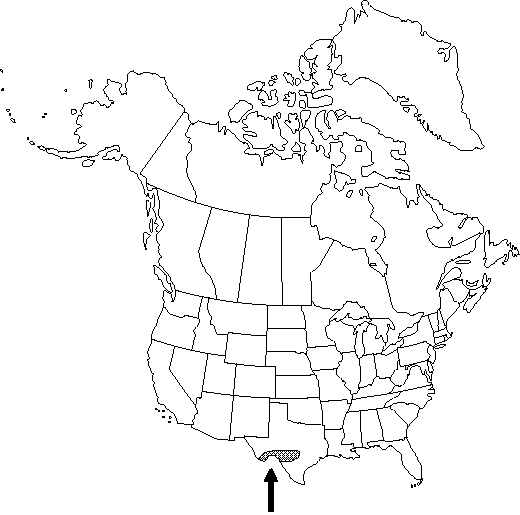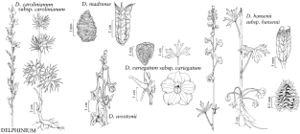Delphinium madrense
Proc. Amer. Acad. Arts 17: 141. 1890.
Stems 30-80 (-100) cm; base often reddish, puberulent. Leaves cauline and basal; basal leaves 0-8 at anthesis; cauline leaves 3-11 at anthesis; petiole 1-15 (-25) cm. Leaf-blade semicircular to cordate, 2-8 × 2-10 cm, nearly glabrous; ultimate lobes 3-12, width 3-10 mm (basal), 2-6 mm (cauline). Inflorescences 5-75 (-98) -flowered; pedicel 1-2.5 (-5) cm, puberulent; bracteoles 2-4 (-8) mm from flowers, green, lanceolate-linear, 3-5 mm, puberulent. Flowers: sepals dark blue to light blue, puberulent, lateral sepals spreading, 9-15 × 5-7 mm, spurs straight, ascending ca. 45 (-90) °, 10-15 (-19) mm; lower petal blades elevated, exposing stamens, 4-7 mm, clefts 2-4 mm; hairs centered, densest on inner lobes near base of cleft, white. Fruits 15-21 mm, 3.5-4.5 times longer than wide, nearly glabrous. Seeds: seed-coat cells with surfaces pustulate.
Phenology: Flowering spring–early summer.
Habitat: Calcareous slopes, oak woods or desert scrub
Elevation: 300-2100 m
Distribution

Tex., Mexico (Coahuila), Mexico (Nuevo León), Mexico (and Tamaulipas)
Discussion
Delphinium madrense hybridizes with D. carolinianum subspp. vimineum and virescens.
Selected References
None.
